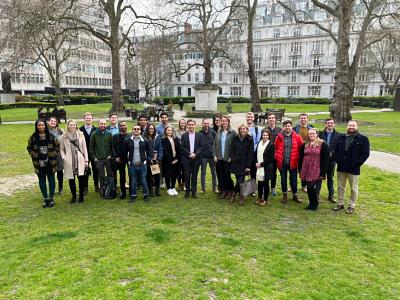CEO Update | 4 April 2022
Government investment into mRNA supply chain
On Thursday last week, the Government announced a £15.9 million investment into Croda’s Staffordshire facility to increase the UK’s capacity of lipids, which are used to create lipid nanoparticles which are a crucial component of mRNA vaccines and therapies. The acceleration of mRNA technology has been astonishing during the pandemic and it is now set to be a significant industrial opportunity. The Government's investment will increase a vital part of the mRNA supply chain here in the UK and will lead to an expansion at the Croda facility, creating jobs and investment in the Staffordshire area.
This investment will support those made by the UK Vaccine Taskforce into CPI’s mRNA training centre and the creation of the Cell and Gene Manufacturing Innovation Centre in Braintree which will have the capability to manufacture mRNA vaccines and therapies. Coupled with significant private sector investments into UK mRNA manufacturing as well as the UK’s strength in academic understanding of mRNA, means the UK life sciences and biotech sector is well poised to be a global leader in this innovative area in the years to come.
Canary Wharf to become life science hub
It was great to see another confidence boost in the UK life science ecosystem as London’s Canary Wharf announced a £500 million project to build Europe’s biggest commercial life science lab. The new-build block, set for completion in 2026, plans to be the largest commercial lab space in Europe and form the cornerstone of a new 3.3-hectare development on the Wharf’s North Quay centred on life sciences businesses spanning biotech to healthcare. I’m looking forward to meeting the developers to hear more of the plans.
BIA at the heart of Royal Society Science of COVID-19 conference
I was delighted to be part of the organising committee, and chair various sessions at the Royal Society’s prestigious "Science of COVID" conference last week. The scientific understanding of COVID, the vaccine and therapeutic response as well as new insight into long Covid were key focuses of the discussion. With thoughtful insight from Patrick Vallance and Chris Whitty, it was a privilege to understand the lessons learnt from the experiences of 2020-2022 which will underpin the UK’s response going forward. I was delighted to showcase the unprecedented partnership working between companies and the Government.
A highlight was hearing from early-career scientists explaining the role they played in the scientific response to the most significant public health challenge we have faced in a generation. The conference received wide media coverage and I would encourage you to watch Dame Kate Bingham’s interview with Beth Rigby from Sky, which explores Kate’s time as Chair of the Vaccine Taskforce and the challenges she faced. Formal proceedings of the conference will be published in a few week's time, for those interested in the detail.
BIA response to Biological Security Strategy
Last week, the BIA submitted its response to the Cabinet Office’s call for evidence on the UK Biological Security Strategy. The call for evidence will inform a refresh of the 2018 strategy, which identified several significant biological security risks, including infectious diseases, antimicrobial resistance and deliberate biological attacks. Our response sets out the vital contribution of the sector to the UK’s COVID-19 response, as well as assessing future opportunities in the areas of genomics and engineering biology. In order to deliver strategic capability on biological security, the Government should continue to provide support to the UK life sciences sector, including by linking the Biological Security Strategy to the strategy set out in the Life Sciences Vision.
BIA response to House of Lords Science and Technology committee on UK science and technology strategy
The BIA has responded to the House of Lords Science and Technology Committee's inquiry into delivering a UK science and technology strategy. In our response, we highlight the strength of the life sciences sector as essential to making the UK a science superpower, pointing to the importance of continued cross-government support for the sector, the need to fully implement the current Life Sciences Vision and strategically linking it to other science and technology strategies across Departments, and the need for greater access to R&D and scale-up finance.
2022 cohort of manufacturing leadership programme

The 2022 cohort of the BIA Manufacturing Advisory Committee Leadership Programme (BIA MAC LeaP) kicked off this week in London with 25 next generation leaders onboarded, taking the total to almost 100 on the programme! LeaP supports the development and training of managers in the biopharmaceutical and cell & gene therapy industries through cross-sector learning and peer networks, helping deliver future leaders. This programme is led by Kit Erlebach Chair of the BIA’s MAC and our Bioprocessing consultant Netty England, and I look forward to engaging and seeing more of this cohort as the year progresses.
Photo caption: Kit Erlebach, Chair of MAC and Strategic and Transformational Manager at Fujifilm Diosynth Biotechnologies with the 2022 cohort of LeaP in London.
Finally, it was great to catch up with friends old and new at "Biotech at the Boat race" event yesterday. This innovative networking event run by RXCelerate was very much enjoyed by all, I hope it becomes an event added to our networking calendars for years to come.

Steve Bates OBE
CEO, BioIndustry Association
More news and updates
.png)
.png)